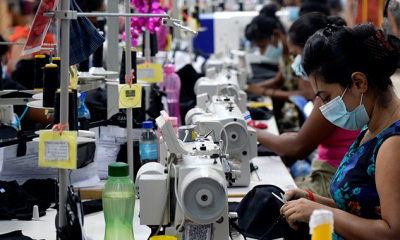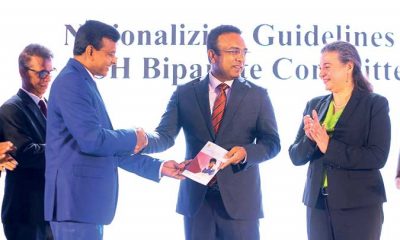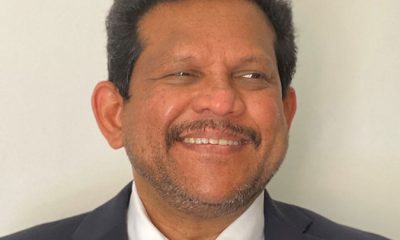News
Improvement in garment sector orders in first two months of 2024, but still to see 2022 volumes
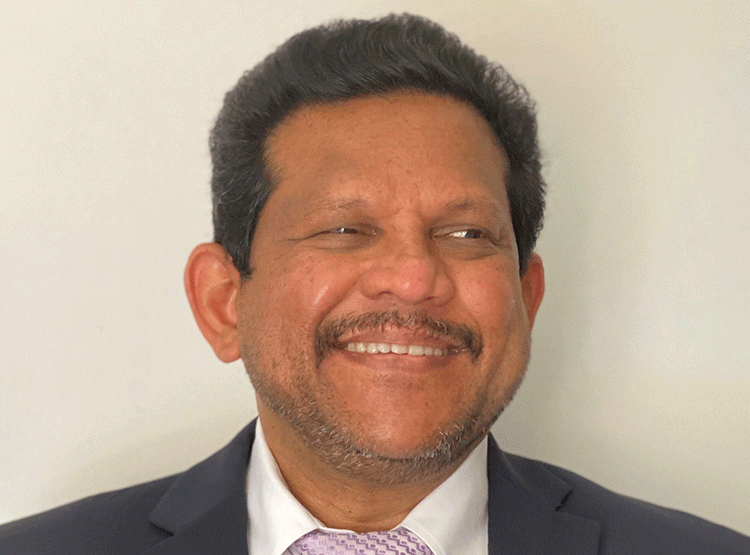
By Saman Indrajith
The apparel sector has received more orders in the first two months of 2024, compared to the same period in 2023, Deputy Chairman of Joint Apparel Association Forum Sri Lanka (JAAF) Felix Fernando said.
However, one must not forget that last year was a particularly bad year for the sector, he said. “We are still not seeing the volumes we did in 2022. We hope things will improve in the coming months.”
Fernando said 2023 was a bad year for the entire export sector, mainly due to external problems. The war in Ukraine adversely affected the economies in the European Union and there was a drop in the purchasing power of people living in the US and the EU.
“In general, the US imported 22 percent less apparel from across the world. This was about 10 percent in EU countries. We got less orders because of this and a lot of factories reduced working hours and some operated only a few days of the week. This year there is a positive development and factories that focus on some categories have got more orders. Some clients, who used to work only in Bangladesh, have come to Sri Lanka to reduce the risk of importing from one location.”
He added that the demand for items, like underwear, and active wear, has increased.
Fernando said there isn’t a big difference in the production cost of apparel between Sri Lanka and Bangladesh. A few months ago, Bangladeshi manufacturers had to increase the salaries of their workers significantly.
“One of the conditions of GSP+ is that the fabric we use for garments must come from Sri Lanka, another SAARC country or an EU country. The quality of fabrics produced in India and Pakistan are low. For high quality material at low cost, most people go to China, Thailand, Vietnam, Indonesia, or Korea. People feel that it is better to get good quality cheap fabrics from the countries I mentioned than trying to adhere to the conditions I stated. Because of that we only use about 60 percent of the quota given by GSP + concessions,” he said.
Fernando went on to say that one of the main problems they face is the policy uncertainty that prevails in the country and the lethargy the State has shown to ensure market access for Sri Lankan businesses. In the long term the industry must look at enhancing productivity and enhancing the quality of labour.
“We are not a country with a lot of people. So, how do we attract new people to work in the industry? A lot of workers left the country in the last two years to work in Eastern Europe and the Middle East. We must create an environment that’s conducive to their return.”
Fernando said the rupee has appreciated against the dollar in the past few months. However, the cost of living has not gone down and a stronger rupee is bad for exporters.
“We have spoken to senior government officials about our concerns. I think they, especially the Governor of the Central bank, are aware of this. This is why the Central Bank is buying dollars from the market. The appreciation of the rupee is good if the cost of living goes down. If the price for food, transport, etc., goes down, our costs will also go down. However, these costs have not gone down,” he said.
News
PM strengthens vocational education and economic ties with Germany

Prime Minister Dr. Harini Amarasuriya visited Hamburg, Germany, focusing on strengthening vocational education and economic partnerships between the two nations. During her visit, she participated in the 102nd East Asia Friendship Dinner, met with German President Frank-Walter Steinmeier, and engaged in high-level discussions on investment, education, and economic reforms.
As a Guest of Honour at the German Asia-Pacific Business Association (OAV) annual gathering, Prime Minister Amarasuriya addressed an audience of business leaders and dignitaries, emphasizing Sri Lanka’s economic recovery and its potential as a growing investment destination. She highlighted the contributions of over 160 German companies in Sri Lanka and invited further collaboration in trade and business.
In her capacity as the Minister of Education, Higher Education, and Vocational Education, the Prime Minister delivered a keynote speech at the ’German-Asian Forum on Vocational Education & Training.’ She acknowledged Germany’s decades-long support in Sri Lanka’s vocational education sector and stressed the importance of modernizing vocational training to align with industry demands. Additionally, she visited ITECH vocational school and German research hubs such as NXP Semiconductors and DESY, discussing collaboration in IT and technology-driven industries.
During her discussions with President Steinmeier, Prime Minister Amarasuriya reiterated Sri Lanka’s commitment to economic stability, social protection, and national unity. She also attended a business roundtable, where she engaged with German companies and government representatives on economic expansion, digitalization, and sustainable development initiatives.
The Prime Minister was accompanied by Sri Lanka’s Ambassador to Germany, Varuni Muthukumarana, and senior embassy officials.
[Prime Minister’s Media Division]
News
IGP under pressure to probe latest custodial death

Attorney-at-Law Senaka Perera on behalf of the Committee for Protecting Rights of Prisoners (Guarantee) Limited has asked Acting IGP Priyantha Weerasooriya to inquire into the death of Sathsara Nimesh soon after he was admitted to the Mulleriyawa mental hospital by Welikada police on the night of April 1.
In a letter dated April 3 addressed to the IGP, the lawyer said that the victim’s mother Lekamwasam Liyanage Samanthi, who visited Welikada police station the following day, thad been old that her son made a bid to commit suicide at the police station. Quoting the victim’s mother the lawyer said that the clothes worn by Nimesh at the time he was taken into custody by Welikada police were found within the premises.
Responding to queries, the human rights activist said that Nimesh had been caught by a group of people at Nawala road, Welikada around 7.30 pm-8 pm on April 1. Alleging that Nimesh who had been undergoing training at a private hospital as a caregiver was acting suspiciously, the group called in the police on 119 emergency line and handed him over to the police, Perera said, urging the IGP to ensure that the police followed laid out procedures when dealing with suspects.
The Attorney-at-law said that the victim’s mother had visited Mulleriyawa hospital and was able to speak with a doctor who had been present at the time Nimesh was brought there. The doctor had told her that her son was barely alive at the time he was brought in. Perera alleged that Welikada police made an attempt to allude that Nimesh was mentally unsound. If the police had been genuinely concerned about Nimesh in case he was experiencing sudden difficulty, they should have rushed him to the National Hospital, Perera said.
Acknowledging the need to deal firmly with those who are on the wrong side of the law, the rights group said that the police couldn’t adopt Gestapo-style strategies.
The National People’s Power (NPP) government couldn’t turn a blind eye to what was going on regardless of the change of government in last Sept. There had been at least two recent deaths in police custody, Perera said, referring to an incident in the Kotahena police area in the third week of February this year.
Police shot dead two persons arrested over the killing of Shashi Kumar in a mobile phone shop at Kotahena. Police claimed that law enforcement men had to open fire when the suspects made an attempt to grab a weapon from an officer while being taken to a hideout to recover hidden guns.
Lawyer Perera said that police should be ashamed to repeat a blatant lie often used by them though they knew no one accepted that.
Political parties represented in parliament should take up this matter vigorously, he said, urging the government to put an end to custodial deaths, he said. The lawyer pointed out that the Supreme Court, too, has intervened in the matter and the issue was taken up at the highest level.
By Shamindra Ferdinando
News
FSP calls proposed defence pact with India betrayal
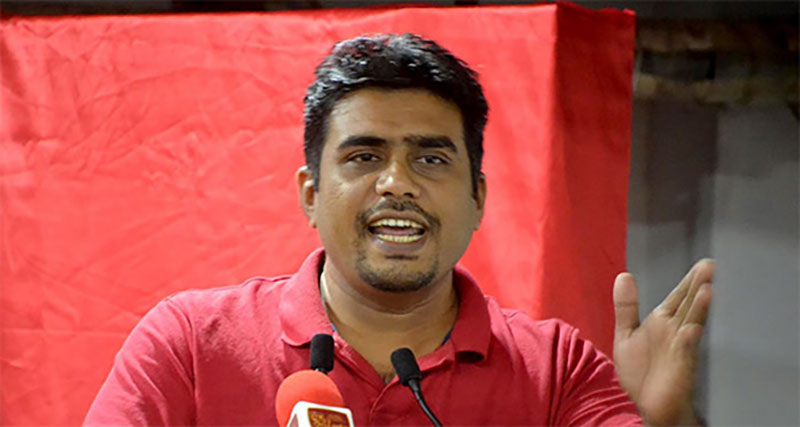
The Frontline Socialist Party (FSP) says that if JVP’s pioneer leader Rohana Wijeweera had been alive today, he, too, would have joined the FSP in opposing the proposed defence agreement between Sri Lanka and India, calling it a serious betrayal of the nation’s interests.
Duminda Nagamuwa, Propaganda Secretary of the FSP, told the media that the JVP-led NPP government was reportedly planning to sign the agreement.Speaking to the media, Nagamuwa said there was lack of transparency surrounding the proposed accord, which had already drawn the attention of Indian experts.
“These experts have termed the agreement as the most significant between the two countries since the Indo-Lanka Peace Accord of 1987, Nagamuwa said.
“Cabinet Spokesman Minister Nalinda Jayatissa recently revealed that a number of agreements involving defence, energy, health, and digitalisation are set to be signed during Indian Prime Minister Narendra Modi’s upcoming visit to Sri Lanka. Foreign Minister Wijitha Herath had previously stated that agreements would be signed covering six key areas, but details of these agreements have not been disclosed to the public,” Nagamuwa said.
“We call upon the people of this country to realise the dangers lurking in these agreements. If the government keeps the people in the dark about their contents, they will be illegitimate.”
He said those agreements had not been presented to Parliament for approval. That marked a troubling continuation of a trend where previous agreements have been signed without proper public discourse or parliamentary scrutiny, he said.
Nagamuwa said that the Memorandum of Understanding (MoU) for the proposed accord had been signed by former President Ranil Wickremesinghe in 2023, and that the JVP/NPP was now proposing the same deal. “If Ranil Wickremesinghe had tried to sign this accord, the people would have taken to the streets in protest. But now, this government is pushing the same agreement forward,” he said.
Nagamuwa appealed to the public to closely observe the processes leading up to the signing of the accord. “We believe that this agreement will have serious implications for the country’s national security. If Comrade Wijeweera were alive today, he too would stand with us in opposing this government’s betrayal of our national interests,” he said.
-

 Sports5 days ago
Sports5 days agoSri Lanka’s eternal search for the elusive all-rounder
-

 News4 days ago
News4 days agoBid to include genocide allegation against Sri Lanka in Canada’s school curriculum thwarted
-

 News6 days ago
News6 days agoGnanasara Thera urged to reveal masterminds behind Easter Sunday terror attacks
-

 Sports1 day ago
Sports1 day agoTo play or not to play is Richmond’s decision
-

 News5 days ago
News5 days agoComBank crowned Global Finance Best SME Bank in Sri Lanka for 3rd successive year
-

 Features5 days ago
Features5 days agoSanctions by The Unpunished
-

 Features5 days ago
Features5 days agoMore parliamentary giants I was privileged to know
-

 Latest News3 days ago
Latest News3 days agoIPL 2025: Rookies Ashwani and Rickelton lead Mumbai Indians to first win





